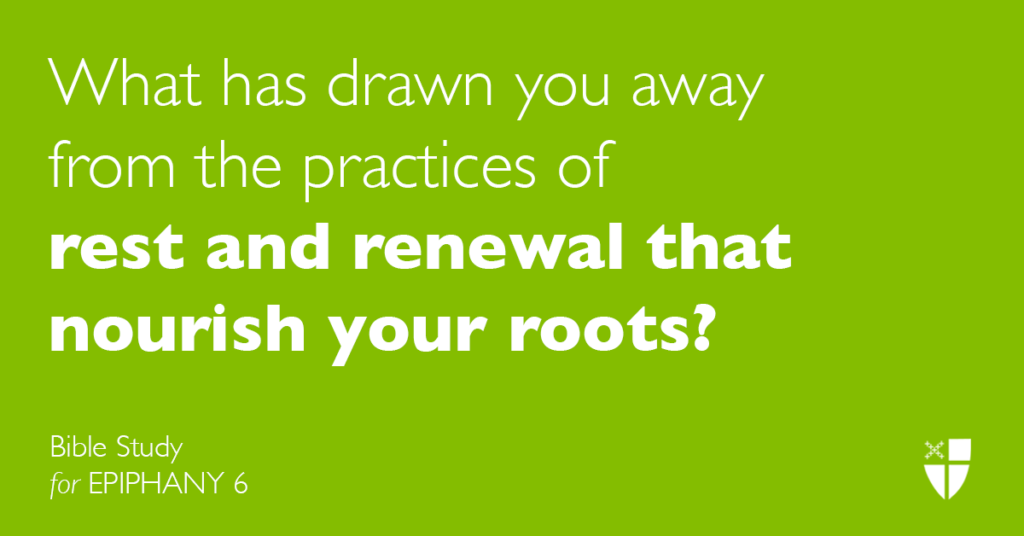Bible Study: Epiphany 6 (C) – 2019
February 17, 2019

Jeremiah 17:5-13
In this passage, as throughout the book of Jeremiah, God continues to call God’s people back to right relationship. God’s use of fiery threats is disturbing, as is the sorting of humanity into two distinct categories of good and bad. And yet, just as the strength of God’s anger heightens the intensity of the prophet’s message, it is the stark contrast of parched scarcity that draws me to the rich, natural imagery of sustainability and groundedness. Where do we find this stream in the desert? In the passage following Jeremiah’s response, God reminds God’s people of the importance of Sabbath: “For the sake of your lives, take care that you do not bear a burden on the sabbath day” (Jeremiah 17:21). Each week, we gather to sink our roots further into the refreshing Word of God and open our eyes and hearts to the relief God offers to us. Jeremiah reminds us, too, that our worship practices call us to reflect on the fickle and transitory nature of the “mere flesh” into which we often place our trust and sense of security instead.
- What has drawn you away from the practices of rest and renewal that nourish your roots?
- As a community, how might we discern and uncover sources of living water that will carry us through drought?
Psalm 1:1-6
“It is not the critic who counts; not the man who points out how the strong man stumbles, or where the doer of deeds could have done them better. The credit belongs to the man who is actually in the arena, whose face is marred by dust and sweat and blood.”
– Theodore Roosevelt, April 23, 1910, quoted from Daring Greatly by Brené Brown
The Book of Psalm begins by paradoxically critiquing the critics of life: “Happy are they who have not… sat in the seats of the scornful” (Psalm 1:1). It is hard not to read the Psalmist’s simplistic division of humanity into the righteous and the wicked as dripping with scorn and schadenfreude. Yet the Psalmist is also challenging us to recognize when we find ourselves in the seats of the scornful, taking delight in jeering down at those who are striving and stumbling in the arena of life. Here then is God’s invitation to get up from the comfortable perch of the skeptical critic and follow God’s voice into the fray. It takes courage to speak out against injustice, yet Psalm 1 reminds us that our faith compels us to pair critical thinking with the brave and vulnerable offering of the fruits we bear.
- Where might you be choosing to stay in the seats of the scornful? How might God be calling you toward bravery and vulnerability?
- As we participate in the building up of God’s Kingdom, how might we pair social criticism with brave creativity? What does it look like to resist an attitude of scornfulness?
1 Corinthians 15:12-20
In the face of Paul’s confident and declarative rhetoric, it is often difficult for me to remember that Paul’s letters represent one significant voice in the larger conversations of the early Christian and Jewish communities of his time. This passage from Paul’s letter to the Corinthians shows that the debate over the resurrection of the dead that waged in Jesus’ time continued in communities to which Paul was writing. As the recent controversy over the Archbishop of Canterbury’s ambassador to the Vatican and other Anglican church leaders have likewise shown, the debate over the literal truth of Jesus’ bodily resurrection is alive and well today. Part of the Anglican charism is understanding the practice of church as a continuation of dialogue about what Jesus Christ’s life, death, and resurrection mean for humanity. How do we practice standing for the essential parts of our tradition while also inviting conversation across difference?
- Why does the debate over resurrection and the afterlife matter today? What does the Christian hope of bodily resurrection still have to offer us?
- In John Lennon’s Imagine, the singer dreams of a world without the promise of the afterlife “and no religion, too.” How might we balance the hope of resurrection with the hope for unity and peace in this lifetime? What might be lost when we focus only on “living for today”? What might be gained?
Luke 6:17-26
Unlike in Matthew’s Gospel, Jesus does not preach the Beatitudes sitting on a mountainside above the crowds. Instead, Luke paints a picture of a Jesus among the crowds of people all striving to touch his body. Rather than separate and exalted, Jesus is quite literally reachable, in the midst of the yearning, struggling mass of humanity. It is from this posture that Jesus “looked up at his disciples” to teach them about the topsy-turvy Kingdom of God. Where we locate Jesus in relationship to us can tell us a lot about how comfortable we feel about reaching for him. As a preacher, Jesus stands first in solidarity with the poor, hungry, mourning, and excluded before teaching about the divine justice God promises to them and to those whose wealth and comfort have kept them separate.
- Where have you located Jesus in your life? When have you experienced Jesus as beside you? When has Jesus felt unreachable?
- How can you bring Jesus’ style of preaching into your own practice of spreading the Good News of the justice-seeking love of God? Whom might Jesus be standing among today?
¡No olvide suscribirse al podcast Sermons That Work para escuchar este sermón y más en su aplicación de podcasting favorita! Las grabaciones se publican el jueves antes de cada fecha litúrgica.


